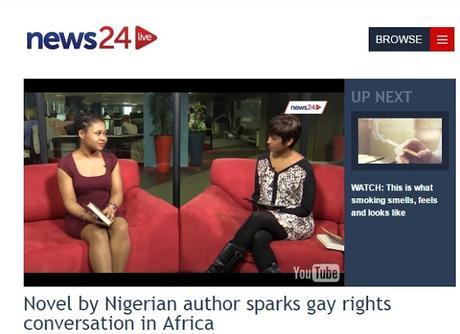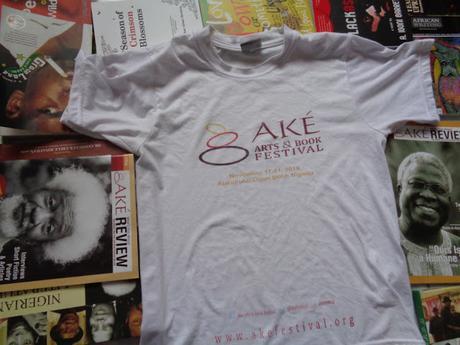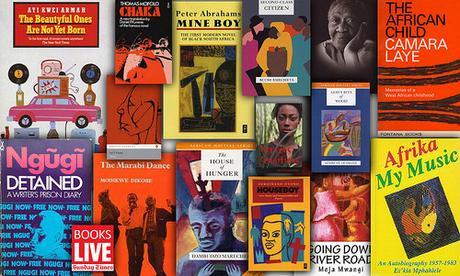
And of course, the reading (and sometimes watching) continued! Speaking of Chinelo Okparanta. Her debut novel,Under the Udala Trees, is said to haveprovoked several conversations around LGBT issues in African; and she joined news24 in the studio todiscuss how it has sparked this conversation.

Screen shot via news24.com
Yaa Gyasi's US$1 billion debut novel, Homegoing, is out in a couple of day (June 7 to be exact); and Gyasi speaks about the inspiration behind her novel, which explores generations of Africans both at home and in the U.S. Over on Vimeo, I watched a short interview with writer Roland Rugero - the first Burundian novelist to be translated into English (Baho!, translated from the French by Christopher Schafer) - speaking about how the past affects present-day BurundiNnedi Okorafor had a short conversation with Kola Tubosun about her craft and her place in the writing industry; and when asked if she ever expected she would reach the stage of recognition she currently has in her career. Okorfor's response:
When I first started writing. I didn't come with any expectations. I just loved to tell stories. I've never expected awards. I don't have any list I'm checking off. You can't control awards. They're not really up to you. They are up to others. Thus, why expect them? It's a surprise and an honor each time it happens. When I heard my name called at the ceremony [Nebula], total and complete shock.I also read about the inspiration for Nnedi Okorafor's Nebula Award-winning novella Binti - a Muslim Scientist, Mariam 'Al-Astrolabiya' Al-Ijliya, living in 10th century Syria. Okorafor learned of Al-Ijliya at a book festival in the UAE, and wove her name into Binti's longer name.
Over on Africa is a Country, they ask if the film adaptation of Cynthia Jele's, Happiness is a Four Letter Word, in South Africa is the new benchmark for cinema in the country? While Mark Bould reviewed Billy Kahora, The Story Club and Pan African Publishers, Imagine Africa 500 - 'the fifteen-story collection [that] emerged from an sf writers' workshop in Malawi, for which the final assignment was to write a story set 500 years in the future.'
'Imagine Africa 500' is a smart and engaging addition to the growing number of anthologies of African sf, not quite as literary as Nerine Dorman's Terra Incognita, not quite as pulpy as Ivor Hartmann's AfroSF collection. Billy Kahora, The Story Club and Pan African Publishers are to be congratulated for setting this all in motion, for their commitment to developing new writers, for their efforts to address the domination of African sf by South Africa and Nigeria - 'Imagine Africa 500' includes five authors from Malawi, four from Uganda and one from Botswana, as well as three Nigerians and two South Africans - and by male writers - two-fifths of the stories are by women, which is not parity but is heading in the right direction.AkeFest 2015 was almost eight months ago, and Mehul Gohil shares a beautiful memoir of his experience - both at the festival and the place, Abeokuta.

Image by Mehul Gohil via Jalada.org
There were also lists - this time from Niq Mhlongo - who 'grew up reading only the African Writers Series' - and shared his top 15 books from the series; while Okayafrica shared 7 African Women Poets that 'will keep you calm, cool and collected for the summer', including Warsan Shire and Safia Elhillo.
The week also saw the start of the Caine Prize 'Blog-a-thon's' on Africa in Words (the first review from Beverly Namozo Nsengiyunva on Adbul Adan's The Lifebloom Gift) and Brittle Paper (the first from Ikhide Ikheloa on Lidudumalingani's Memories We Lost). Ikhide Ikheola also did his review of all the shortlisted Caine Prize stories:
Abdul Adan's, 'The Lifebloom Gift', is a dark, troubling story about sexuality and other identities; Lesley Nneka Arimah's, 'What It Means When A Man Falls From The Sky', is a dark, fascinating and brilliant story about identity and gentrification; ... Tope Folarin's 'Genesis', is a dark, haunting commentary on mental illness and a heart warming story about children growing up in the shadows of their parents' and Utah's anxieties; Bongani Kona's 'At Your Requiem', is a dark tale of childhood wars (rivalries, child sexual abuse etc.) and Lidudumalingani's 'Memories We Lost, is a dark, affecting tale about sibling and communal love and mental illness. You get the point. It's all dark, these writes thrive on the edges of a dark, dark world.In wonderful news, Irenosen Okojie's debut novel, Butterfly Fish, has been shortlisted for the 2016 Betty Trask Prize. The judges comment on the book:
A bittersweet story uniting different traditions of narrative to create a whole new geography of imagination. - Michèle RobertsLitHub shared a conversation between Leila Aboulela annd Elnathan John on writing Islamic identity and being labelled a political writer: They discuss the characters at the heart of their novels, the roots of violence in life and in literature, and the question of audience when writing from a non-Western context.
Leila Aboulela: ... I want to start by asking you about the very first chapter, 'Bayan Layi'. I was one of the judges of the Caine Prize in 2013 when we short-listed 'Bayan Layi' for the prize. To me it felt like a complete, satisfying and accomplished short story. Was it, though, the first chapter of a novel in progress or did you later on take the character/idea further and develop it as a novel?
Elnathan John: ... 'Bayan Layi', in its first incarnation was only a short story written following the 2011 electoral violence in my home state Kaduna and other places in Nigeria. I was venturing an exposition of why the violence happened and what state the north was in general. I was giving it all a whirl in my mind letting the minutiae around me - the stories I was hearing and seeing and unfold - coalesce into some composite picture I could understand and explain to others. After the story was written and as much satisfaction that gave me, it became clearer (the more I had to read it on the Caine Prize circuit), that it was just the beginning of something larger and more pithy. That was when I decided to push out a few more chapters like 'Bayan Layi'. By the fourth chapter, its form manifested itself to me and guided me by the hand until 'Born on A Tuesday' was born.Ellah Wakatama Allfrey writes about 'African writers needing new ways to tell stories' and how 'creative non-fiction has the potential to close the gap ... '
Finally, a few non-African literature reads that I enjoyed this week - on 'Roots' being reborn, as well as the most powerful online reactions to its Premiers on Memorial Day (May 30th) in the States; a sad but beautiful essay on mourning the loss of a loved one through the books they left behind; on how Asian-American actors are fighting for visibility
; and how Hollwood's often annoyingly lazy treatment of Africa on Screen continues with the new AMC series, Preacher. And if like me, you grew up watching (and loving) Pinky and the Brain, someone out there has ranked every single one of Brain's schemes to take over the world! Pure genius! I've also been overdosing on content around the great, Muhammad Ali, such as this one on why he felt more free on the African continent than in the States, as I celebrate his life - and as a friend wrote in a beautiful facebook post, he is 'reflective' about Ali's death - 'and it is not even his celebrated greatness, but the beauty of his longevity.'Happy Reading, and see you for the next edition of Read it! Loved it! ...with a little sprinkling of Watched it!


posted on 01 July at 23:20
Read online stories and poems.